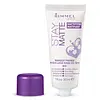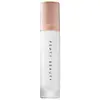What's inside
What's inside
 Key Ingredients
Key Ingredients

 Benefits
Benefits

 Concerns
Concerns

 Ingredients Side-by-side
Ingredients Side-by-side

Water
Skin ConditioningCyclopentasiloxane
EmollientTalc
AbrasiveCetyl PEG/PPG-10/1 Dimethicone
EmulsifyingAluminum Starch Octenylsuccinate
AbsorbentPropylene Glycol
HumectantVinyl Dimethicone/Methicone Silsesquioxane Crosspolymer
Isononyl Isononanoate
EmollientPolypropylene
Silica
AbrasiveSilica Dimethyl Silylate
EmollientDisteardimonium Hectorite
StabilisingMagnesium Sulfate
Bis-PEG/PPG-14/14 Dimethicone
EmollientGlycerin
HumectantLaureth-7
EmulsifyingTribehenin
EmollientXanthan Gum
EmulsifyingPhenoxyethanol
PreservativePropylene Carbonate
SolventSorbitan Sesquioleate
EmulsifyingChlorphenesin
AntimicrobialTocopheryl Acetate
AntioxidantDisodium EDTA
Triethoxycaprylylsilane
Pentaerythrityl Tetra-Di-T-Butyl Hydroxyhydrocinnamate
AntioxidantCI 77891
Cosmetic ColorantWater, Cyclopentasiloxane, Talc, Cetyl PEG/PPG-10/1 Dimethicone, Aluminum Starch Octenylsuccinate, Propylene Glycol, Vinyl Dimethicone/Methicone Silsesquioxane Crosspolymer, Isononyl Isononanoate, Polypropylene, Silica, Silica Dimethyl Silylate, Disteardimonium Hectorite, Magnesium Sulfate, Bis-PEG/PPG-14/14 Dimethicone, Glycerin, Laureth-7, Tribehenin, Xanthan Gum, Phenoxyethanol, Propylene Carbonate, Sorbitan Sesquioleate, Chlorphenesin, Tocopheryl Acetate, Disodium EDTA, Triethoxycaprylylsilane, Pentaerythrityl Tetra-Di-T-Butyl Hydroxyhydrocinnamate, CI 77891
Water
Skin ConditioningDimethicone
EmollientIsononyl Isononanoate
EmollientPolypropylene
Cetyl PEG/PPG-10/1 Dimethicone
EmulsifyingPentylene Glycol
Skin ConditioningIsododecane
EmollientNylon-12
Polymethyl Methacrylate
Hdi/Trimethylol Hexyllactone Crosspolymer
Maltose
MaskingPhenoxyethanol
PreservativeSodium Chloride
MaskingDimethicone/Vinyl Dimethicone Crosspolymer
Skin ConditioningMagnesium Sulfate
Ethylhexylglycerin
Skin ConditioningDisteardimonium Hectorite
StabilisingAgave Tequilana Leaf Extract
AstringentDimethiconol
EmollientSilica
AbrasivePropylene Carbonate
SolventParfum
MaskingBiosaccharide Gum-4
Skin ConditioningTocopherol
AntioxidantWater, Dimethicone, Isononyl Isononanoate, Polypropylene, Cetyl PEG/PPG-10/1 Dimethicone, Pentylene Glycol, Isododecane, Nylon-12, Polymethyl Methacrylate, Hdi/Trimethylol Hexyllactone Crosspolymer, Maltose, Phenoxyethanol, Sodium Chloride, Dimethicone/Vinyl Dimethicone Crosspolymer, Magnesium Sulfate, Ethylhexylglycerin, Disteardimonium Hectorite, Agave Tequilana Leaf Extract, Dimethiconol, Silica, Propylene Carbonate, Parfum, Biosaccharide Gum-4, Tocopherol
Ingredients Explained
These ingredients are found in both products.
Ingredients higher up in an ingredient list are typically present in a larger amount.
This ingredient is a high molecular weight silicone. It has emulsifying and skin conditioning properties.
Disteardimonium Hectorite comes from the clay mineral named hectorite. It is used to add thickness to a product.
It can also help stabilize a product by helping to disperse other ingredients.
Hectorite is a rare, white clay mineral.
Learn more about Disteardimonium HectoriteIsononyl Isononanoate is a synthetic skin-conditioner and texture enhancer. It is created from nonanoic acid, a fatty acid found in cocoa and lavender oil.
As an emollient, Isononyl Isononanoate helps keep your skin soft and smooth. This is because emollients create a barrier on the skin to trap moisture in.
Isononyl Isononanoate helps give products a velvet feel and improves spreadability.
Learn more about Isononyl IsononanoateMagnesium Sulfate is a salt. More specifically, it is an epsom salt, or the bath salt used to help relieve muscle aches.
Despite having ‘sulfate’ in the name, it isn’t a surfactant or cleansing agent like sodium lauryl sulfate. Unlike those sulfates, magnesium sulfate doesn’t have the same cleansing or foaming properties (it's simply a type of salt).
In cosmetics, Magnesium Sulfate is used to thicken a product or help dilute other solids. It is a non-reactive and non-irritating ingredient.
One study shows magnesium deficiency may lead to inflammation of the skin. Applying magnesium topically may help reduce inflammation.
You can find this ingredient in sea water or mineral deposits.
Learn more about Magnesium SulfatePhenoxyethanol is a preservative that has germicide, antimicrobial, and aromatic properties. Studies show that phenoxyethanol can prevent microbial growth. By itself, it has a scent that is similar to that of a rose.
It's often used in formulations along with Caprylyl Glycol to preserve the shelf life of products.
We don't have a description for Polypropylene yet.
This ingredient is a solvent. It helps dissolve active ingredients and alter the texture of products.
Propylene Carbonate is commonly used in makeup and with clay, such as montmorillonite or bentonite.
Studies show this ingredient to be safe for cosmetics. When it is undiluted, it can cause skin irritation. (It is always diluted in skincare and makeup). This ingredient is water-soluble.
Propylene Carbonate is created from propylene glycol and carbonic acid.
Learn more about Propylene CarbonateSilica, also known as silicon dioxide, is a naturally occurring mineral. It is used as a fine, spherical, and porous powder in cosmetics.
Though it has exfoliant properties, the function of silica varies depending on the product.
The unique structure of silica enhances the spreadability and adds smoothness, making it a great texture enhancer.
It is also used as an active carrier, emulsifier, and mattifier due to its ability to absorb excess oil.
In some products, tiny microneedles called spicules are made from silica or hydrolyzed sponge. When you rub them in, they lightly polish away dead skin layers and enhance the penetration of active ingredients.
Learn more about SilicaWater. It's the most common cosmetic ingredient of all. You'll usually see it at the top of ingredient lists, meaning that it makes up the largest part of the product.
So why is it so popular? Water most often acts as a solvent - this means that it helps dissolve other ingredients into the formulation.
You'll also recognize water as that liquid we all need to stay alive. If you see this, drink a glass of water. Stay hydrated!
Learn more about Water